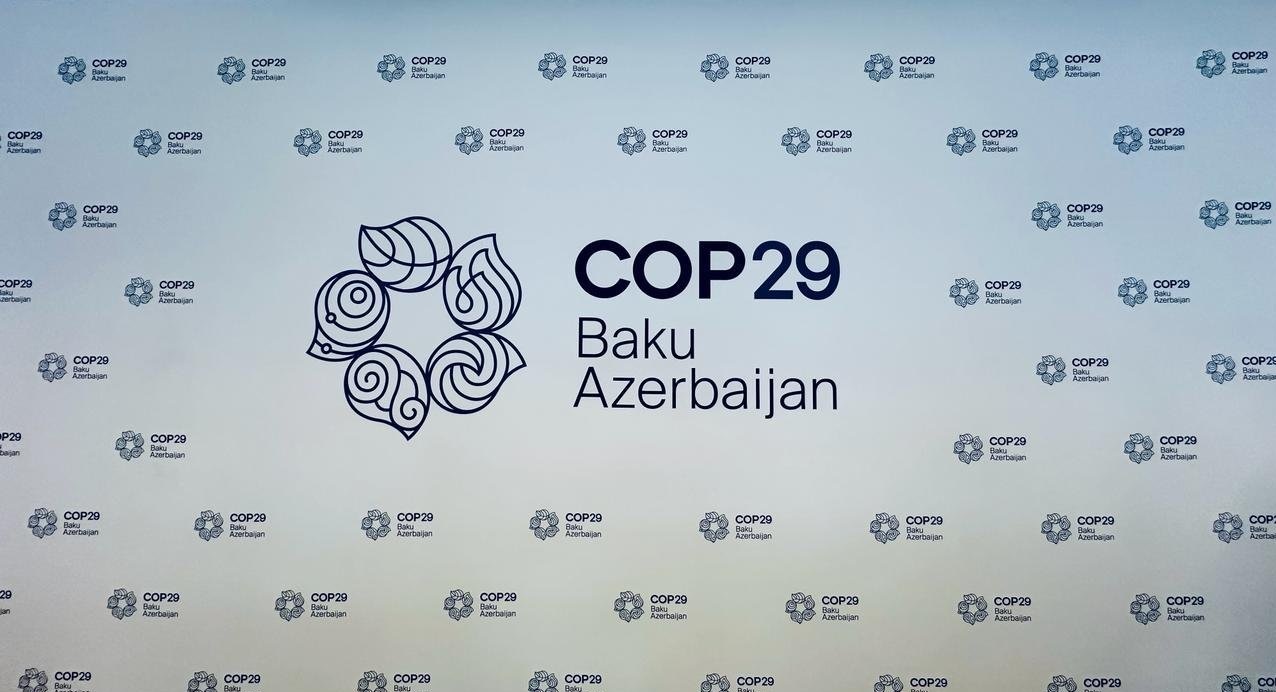Azerbaijan officially unveiled the logo for the upcoming 29th session of the Conference of the Parties to the United Nations Framework Convention on Climate Change (COP29), during a press conference in Baku on Monday.
The logo, rich in cultural and ecological symbolism, features the buta – a traditional Azerbaijani design – alongside motifs representing leaves and water droplets.
Narmin Jarchalova, Chair of the COP29 Operating Company and Chief Operating Officer, explained the deep symbolism of the logo's design.
"The logo reflects the multifaceted initiatives of the COP29 presidency and is based on a synthesis of the symbols of the buta, leaf, and drops of water. In the context of the importance of natural resources, it acknowledges ecological vulnerability and Azerbaijan's rich cultural heritage,” Azertag quotes Jarchalova as saying.
She further elaborated on the significance of the design elements: “With its roots in Azerbaijan's history and its timeless cultural heritage, the buta motif embraces sustainability and innovation, and forms a bridge between past and future. The combination of buta motifs represents unity, and in depicting drops of water, the buta motifs also represent five different elements – flora and fauna, air and wind, water, energy, and the universe.”
Jarchalova added that in an era of heightened climate challenges, the COP29 logo reflects the importance of seamless relations between humanity and the environment, ecologically sensitive behavior, and results-oriented action.
Azerbaijan will host COP29 in November this year. Confirmation of Azerbaijan’s COP29 host status came at the plenary session of COP28 on December 11, 2023, after Baku won collective backing from other Eastern European countries.
Azerbaijan confirmed the commitments under the 2015 Paris Agreement to reduce the emission of greenhouse gases by 35 percent by 2030 and bring it to 40 percent by 2050.
Baku signed the 2015 Paris Agreement, a legally binding treaty on climate change, in April 2016 and has since been actively working to deliver on the issues prioritized by the government.
The Paris Agreement sets long-term goals to guide all nations to reduce global greenhouse gas emissions substantially and hold global temperature increase to well below 2°C above pre-industrial levels. It adds that nations must pursue efforts to limit global temperature increase to 1.5°C above pre-industrial levels and recognizes that this would significantly reduce the risks and impacts of climate change.
It also calls on the signatories to periodically assess the collective progress towards achieving the purpose of this agreement and its long-term goals, as well as provide financing to developing countries to mitigate climate change, strengthen resilience and enhance abilities to adapt to climate impacts.
The transition from traditional sources to alternative energy is among the priorities of the Azerbaijani government. Renewables are expected to make up 30 percent of Azerbaijan’s electricity generation by 2030. Estimates put the renewable energy potential of Azerbaijan at 37,000 MW, 10,000 of which was unveiled after the liberation of the country’s territories from the Armenian occupation in 2020.
The potential of wind power stands at 59.2 percent of the overall renewable energy potential of Azerbaijan. The solar power comes in at number two with a total of 8,000 MW potential. Biomass, geothermal, and hydropower (excluding large hydropower stations) are also seen as promising renewables at 900 MW, 800 MW, and 650 MW, respectively.
The Azerbaijani government also plans to transform the liberated Karabakh (Garabagh) and East Zangazur regions fully into a “Net-Zero Emission” Zone as a priority within the ongoing reconstruction and development projects, as well as reduce carbon dioxide emissions by 40 percent by 2050. The green energy potential of the liberated territories of Azerbaijan includes almost all types of renewable energy sources, including hydro, solar, wind, and geothermal.
The Caspian Sea sector of Azerbaijan has also 157 GW of renewable energy potential.







 President Ilham Aliyev shed light on the evolving contours of the peace process with Armenia during an international conference in Baku this week. ...
President Ilham Aliyev shed light on the evolving contours of the peace process with Armenia during an international conference in Baku this week. ...
 Azerbaijan and Armenia started the process of demarcation of their border on Tuesday, with the installation of the first border markers based on ge...
Azerbaijan and Armenia started the process of demarcation of their border on Tuesday, with the installation of the first border markers based on ge...
 Iranian President Ebrahim Raisi expressed Tehran’s readiness to participate in significant development projects in Sri Lanka during the inauguratio...
Iranian President Ebrahim Raisi expressed Tehran’s readiness to participate in significant development projects in Sri Lanka during the inauguratio...
 As the conflict between Ukraine and Russia escalates, the strategic importance of Kharkiv, Ukraine's second-largest city, has come sharply into focus.
As the conflict between Ukraine and Russia escalates, the strategic importance of Kharkiv, Ukraine's second-largest city, has come sharply into focus.
 Iran and Pakistan have signed eight cooperation documents in various fields, and agreed to strengthen ties to fight terrorism in the region.
Iran and Pakistan have signed eight cooperation documents in various fields, and agreed to strengthen ties to fight terrorism in the region.



